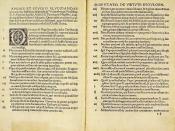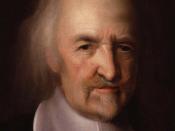The Modern Era
The Modern Era of political philosophy is best characterized as a revolt against the traditional constraints of the time. Machiavelli believed that politics should be separate and distinct from ethics, morality, and religion. Protestant reformers such as Luther and Calvin went head to head with the Catholic Church, paving the way for religious individualism and incorporating various political revisions. Hobbes called for a major overhaul in England concerning not only political and religious issues, but social and economic ones as well. As modern philosophers began to voice their opinions, Central, Southern, and Western Europe began to change drastically--changes that would affect the direction of Western political thought forever.
Niccolo Machiavelli, born in Florence, Italy in 1469, was the first political philosopher to recognize the importance and potential of the nation-state, an idea he shared with the world. This idea was shared primarily through Machiavelli's most notable works: The Prince and Discourses on the First Ten Books of Titus Livius.
The Prince was dedicated to the new Medici (the ruling family in Florence at the time) ruler, Lorenzo; some modern interpreters have viewed the work primarily as a plea for forgiveness, as Machiavelli wanted his civil service job back after being suspected of treason. As indicated in his two major works, Machiavelli had two distinct goals: the desire to return to active government service and the promotion of stability and freedom from foreign control, secular or religious, for all of Italy.
Martin Luther's (1483-1546) discrepancies with the Catholic Church began early in his career when he attacked the sale of indulgences and also came to the conclusion that human nature is wretched and sinful. He also criticized the pope's absolutism and the church hierarchy. When Luther finally poured his heart out onto paper in 1517, the result...


